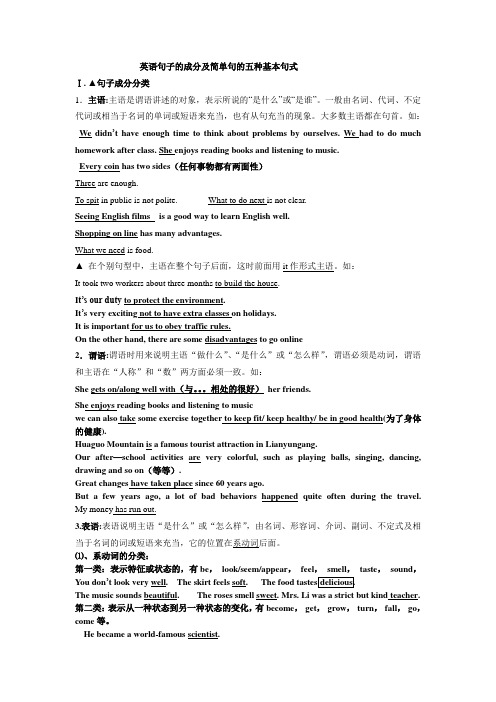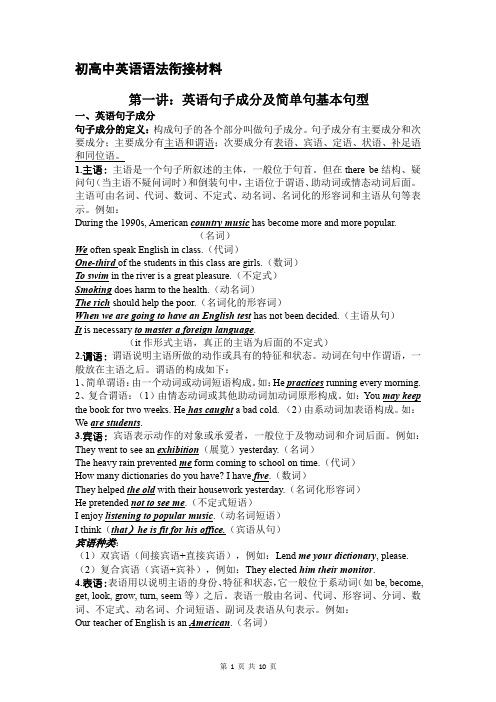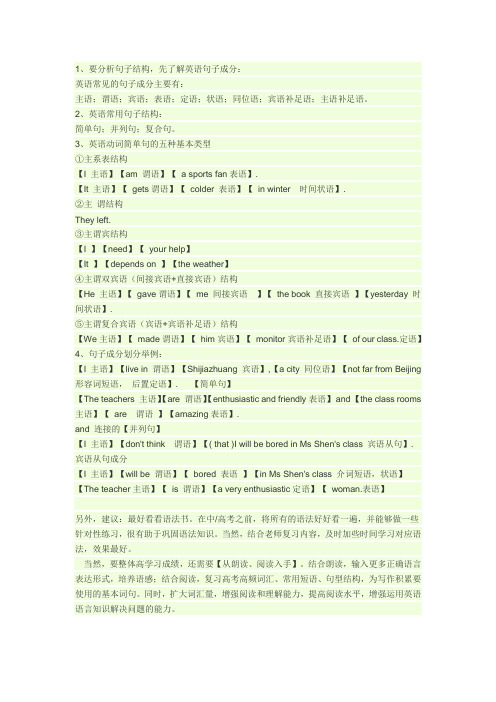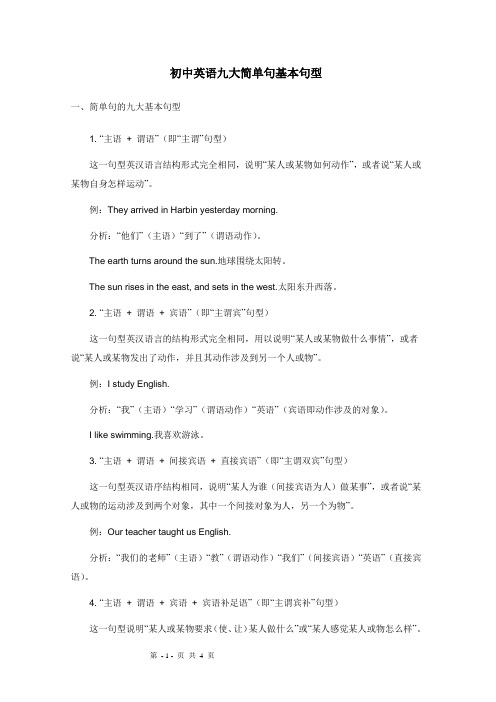英语句子种类与简单句的基本句型4
英语句子的成分及简单句的五种基本句式

英语句子的成分及简单句的五种基本句式Ⅰ. ▲句子成分分类1.主语:主语是谓语讲述的对象,表示所说的“是什么”或“是谁”。
一般由名词、代词、不定代词或相当于名词的单词或短语来充当,也有从句充当的现象。
大多数主语都在句首。
如:We didn’t have enough time to think about problems by ourselves. We had to do muchhomework after class. She enjoys reading books and listening to music.Every coin has two sides(任何事物都有两面性)Three are enough.To spit in public is not polite. What to do next is not clear.Seeing English films is a good way to learn English well.Shopping on line has many advantages.What we need is food.▲在个别句型中,主语在整个句子后面,这时前面用it作形式主语。
如:It took two workers about three months to build the house.I t’s our duty to protect the environment.It’s very exciting not to have extra classes on holidays.It is important for us to obey traffic rules.On the other hand, there are some disadvantages to go online2.谓语:谓语时用来说明主语“做什么”、“是什么”或“怎么样”,谓语必须是动词,谓语和主语在“人称”和“数”两方面必须一致。
句子成分和简单句基本句型

Unit1句子成分和简单句基本句型学习目标:( Learning Aims)1、通过分析典型句子,了解英语中词的分类,能够说出句子中的常见成分:2、通过观察、学习例句,能够判断各种简单句基本句型和there be句型3、通过持续相关训练,能够在阅读中快速断句和分析句子结构,能在作文中用正确的句子结构表达自己的思想英语十大词类:英语中的词可以根据词义、句法作用和形式持征分为十大词类。
1、名词(n)是表示人、事物、地方、现象及其它抽象概念的词,在句子中可以作主语,表语,宾语,补足语,同位语及定语。
2、动词(v)是用来描述主语的动作、行为或状态的词,在句子中作谓语,是句子中不可缺少的一部分。
英语中的动词有不同的形式,这些形式体现在动作发生的时间(即时态)、主动发出动作还是被动接受动作(即语态)和说话者的口气、感情等(即语气)。
3、形容词(adj)是描述人或事物的性质、特征、状态。
主要用于修饰名词或部分代词,或者放在系动词后面做表语。
4、副词(adv)是指在句子中表示行为或状态特征的词,用以修饰动词、形容词、其他副词或整个句子,表示时间、地点、程度、方式等。
5、代词(pron)是代替名词或起名词作用的词。
主要分为人称代词、物主代词、不定代词,反身代词、疑问代词、关系代词、连接代词等。
6介词(prep):介词是一种虚词,不重读,也不能单独作句子成分,通常用于名词代词前构成介词短语。
介词后的名词或代词称为介词的宾语。
7、连词(conj):是连接单词、短语或句子的一种虚词,在句中不单独作句子成分,一般不重读,按性质分为并列连词和从属连词。
8、冠词(art)英语中有a, an和the这三个冠词,a, an是不定冠词,the是定冠词。
9、数词(num,)是表示数目多少或顺序先后的词。
10、感叹词( interj):表示说话时的感情或语气。
二、句法相关知识①___________( subject)Betty likes her new bike To see is to believe. What he says agrees with what he does②__________predicateJane practices running every morning.You are sincerely invited to a party to be given at the teachers' Club.Without your help, we couldn't have finished the work ahead of time.③__________objectThey went to see an exhibition yesterday.Do you subscribe to her pessimistic view of the state of the economy.He gave me some ink. Our teacher told us an interesting story.④__________predicativeHer sister is a nurse. The two rooms look different.We were at home last night. His cup is broken.Job's motto is that we should stay hungry and stay foolish.⑤__________complementWe elected him monitor. I find it pleasant to be with your family.⑥__________attributeThis is a green jeep How many girl students are there in this class?I have something to tell you. He is always the first to arrive.⑦__________adverbialSteam engines were used to pull the carriages and it must have been fairly unpleasant for the passengers.with all the smoke and noiseShe will arrive in Beijing on Monday He stopped to have a look. we'll set out if it is fine tomorrow.⑧__________appositiveWe each have an English dictionaryI made a promise to my self that this year, my last year in high school, would be different⑨__________parenthesisI am amazed to hear from my school teacher again, believe it or not, it is ten years since we met last. You can, if you please, come to join us in the game(二).句子的分类1、句子按使用目的分为陈述句、疑问句、祈使句和感叹句①陈述句:分为肯定句和否定句Man was born good. In fact, the room was not made to be a gift. All hope was not lost.②疑问句:分为一般疑问句、特殊疑问句,选择疑问句和反意疑问句。
英语句子成分及简单句5种基本句型

英语句子成分及简单句5种基本句型一、英语句子成分根据英语词汇在英语句子中的地位和作用, 英语句子的成分可分为主语、谓语、宾语、宾语补足语、表语、定语、状语、同位语及独立成分等。
其中,主语和谓语是句子的主要成分,一般情况下,一个句子不能缺少这两种成分。
现将不同句子成分的用法列举如下:1. 主语:表示句子所要说明或描述的人或事物,一般由名词、代词或相当于名词的词组或句子充当,置于句首。
如:It's getting cold. 天冷起来了。
Now everything is ready. 现在一切都准备好了。
The teacher is very kind to us. 老师对我们很好。
2. 谓语:说明或描述主语的动作、状态或特征,由动词或动词短语充当,位于主语之后。
如:Mother bought me a birthday present. 妈给我买了个生日礼物。
We have finished our work already. 我们已经完成了工作。
3. 表语:表示主语的身份、性质、状态和特征,一般由名词、形容词、或相当于名词、形容词的词、短语或句子充当,位于系动词之后,形成英语独有的主系表结构。
如:Be careful! 小心!All the students are lovely. 所有的学生都很可爱。
He looks very angry. 他看上去很生气。
4. 宾语:指动作所涉及的人或事物,一般由名词、代词或相当于名词的词组或句子充当,位于动词之后。
如:He wrote many plays. 他写了许多剧本。
She loves swimming. 她喜欢游泳。
5. 宾语补足语:用来对宾语进行补充和说明,一般由名词、形容词、副词、介词短语或非谓语动词充当。
如:He told us to stay. 他叫我们留下。
I've never seen her dancing. 我从未看见过她跳舞。
1.英语句子成分及简单句基本句型

初高中英语语法衔接材料第一讲:英语句子成分及简单句基本句型一、英语句子成分句子成分的定义:构成句子的各个部分叫做句子成分。
句子成分有主要成分和次要成分;主要成分有主语和谓语;次要成分有表语、宾语、定语、状语、补足语和同位语。
1.主语:主语是一个句子所叙述的主体,一般位于句首。
但在there be结构、疑问句(当主语不疑问词时)和倒装句中,主语位于谓语、助动词或情态动词后面。
主语可由名词、代词、数词、不定式、动名词、名词化的形容词和主语从句等表示。
例如:During the 1990s, American country music has become more and more popular.(名词)We often speak English in class.(代词)One-third of the students in this class are girls.(数词)To swim in the river is a great pleasure.(不定式)Smoking does harm to the health.(动名词)The rich should help the poor.(名词化的形容词)When we are going to have an English test has not been decided.(主语从句)It is necessary to master a foreign language.(it作形式主语,真正的主语为后面的不定式)2.谓语:谓语说明主语所做的动作或具有的特征和状态。
动词在句中作谓语,一般放在主语之后。
谓语的构成如下:1、简单谓语:由一个动词或动词短语构成。
如:He practices running every morning.2、复合谓语:(1)由情态动词或其他助动词加动词原形构成。
如:You may keep the book for two weeks. He has caught a bad cold. (2)由系动词加表语构成。
初中英语语法基础 句子结构和类型专题讲解 (附同步练习题无答案)

初中英语语法基础句子结构与类型专题讲解一.句子的种类(一)根据结构划分:①简单句:(5种基本句型)S+Vi(主+谓)S+V系动词+ P (主+系+表)S+Vt+O(主+谓+宾)S+Vt+IO+DO(主+谓+间宾+直宾)S+Vt+O+OC(主+谓+宾+宾补)②并列句and, but, or, soThis is me and these are my friends.They must stay in water, or they will die.It’s not cheap, but it is very good.It was late, so I went to bed.③复合句:包含一个主句和一个或几个从句的句子叫复合句,从句由引导词或连词引导。
名词性从句(宾语,主语,表语,同位语)从句形容词性从句(定语从句)副词性从句(状语从句)(二)根据功能划分:陈述句, 祈使句, 感叹句,疑问句(一般疑问句,特殊疑问句,选择疑问句,反意疑问句等)1)陈述句:说明一个事实或陈述一种看法。
例如:Light travels faster than sound.光比声传播速度快。
(说明事实)The film is rather boring.这部电影很乏味。
(说明看法)2)疑问句:提出问题。
有以下四种:a. 一般疑问句:Can you finish the work in time?b. 特殊疑问句:Where do you live?c. 选择疑问句:Do you want tea or coffee?d. 反意疑问句:He doesn't know her, does he?3)祈使句:提出请求,建议或发出命令。
Don't be nervous!Let’s go fishing tomorrow.4)感叹句:表示说话人惊奇、喜悦、愤怒等情绪。
What good news it is ! How beautiful the girl is !二.简单句的基本句型介绍:1. 基本句型一:S+Vi (主+不及物动词)主语:可以作主语的成分有名词,主格代词,动词不定式,动名词等等。
英语句子成分和简单句五种基本句型

1、要分析句子结构,先了解英语句子成分:英语常见的句子成分主要有:主语;谓语;宾语;表语;定语;状语;同位语;宾语补足语;主语补足语。
2、英语常用句子结构:简单句;并列句;复合句。
3、英语动词简单句的五种基本类型①主系表结构【I 主语】【am 谓语】【a sports fan表语】.【It 主语】【gets谓语】【colder 表语】【in winter 时间状语】.②主谓结构They left.③主谓宾结构【I 】【need】【your help】【It 】【depends on 】【the weather】④主谓双宾语(间接宾语+直接宾语)结构【He 主语】【gave谓语】【me 间接宾语】【the book 直接宾语】【yesterday 时间状语】.⑤主谓复合宾语(宾语+宾语补足语)结构【We主语】【made谓语】【him宾语】【monitor宾语补足语】【of our class.定语】4、句子成分划分举例:【I 主语】【live in 谓语】【Shijiazhuang 宾语】,【a city 同位语】【not far from Beijing 形容词短语,后置定语】. 【简单句】【The teachers 主语】【are 谓语】【enthusiastic and friendly表语】and 【the class rooms 主语】【are 谓语】【amazing表语】.and 连接的【并列句】【I 主语】【don't think 谓语】【( that )I will be bored in Ms Shen's class 宾语从句】. 宾语从句成分【I 主语】【will be 谓语】【bored 表语】【in Ms Shen's class 介词短语,状语】【The teacher主语】【is 谓语】【a very enthusiastic定语】【woman.表语】另外,建议:最好看看语法书。
中学初中英语语法——九大简单句基本句型

初中英语九大简单句基本句型一、简单句的九大基本句型1. “主语+ 谓语”(即“主谓”句型)这一句型英汉语言结构形式完全相同,说明“某人或某物如何动作”,或者说“某人或某物自身怎样运动”。
例:They arrived in Harbin yesterday morning.分析:“他们”(主语)“到了”(谓语动作)。
The earth turns around the sun.地球围绕太阳转。
The sun rises in the east, and sets in the west.太阳东升西落。
2. “主语+ 谓语+ 宾语”(即“主谓宾”句型)这一句型英汉语言的结构形式完全相同,用以说明“某人或某物做什么事情”,或者说“某人或某物发出了动作,并且其动作涉及到另一个人或物”。
例:I study English.分析:“我”(主语)“学习”(谓语动作)“英语”(宾语即动作涉及的对象)。
I like swimming.我喜欢游泳。
3. “主语+ 谓语+ 间接宾语+ 直接宾语”(即“主谓双宾”句型)这一句型英汉语序结构相同,说明“某人为谁(间接宾语为人)做某事”,或者说“某人或物的运动涉及到两个对象,其中一个间接对象为人,另一个为物”。
例:Our teacher taught us English.分析:“我们的老师”(主语)“教”(谓语动作)“我们”(间接宾语)“英语”(直接宾语)。
4. “主语+ 谓语+ 宾语+ 宾语补足语”(即“主谓宾补”句型)这一句型说明“某人或某物要求(使、让)某人做什么”或“某人感觉某人或物怎么样”。
例:He asked her to go there.分析:“他”(主语)“要求”(谓语动作)“她”(宾语即动作涉及的对象)“去那里”(补语—补充说明宾语应做什么)。
5. “主语+ have + 宾语”(即“拥有”句型)这一句型主要用于说明“某人或某物拥有什么(宾语,即有形或无形的资源)”。
句子成分及简单句的6个基本句型

6.Many animals live in trees. 主 + 谓
7.Her father looks young.
主+系+表
8.She teaches us English.
• 小结:定语通常由__形__容__词__和 _形__容__词__性__物__主___代__词_充当,也可以是 ____名__词__、__介__词__短___语___、_分__词___、 _定__语__从__句____等。
• 定语一般位于__被__修__饰___词____之前,但若 修饰___复__合__不__定__代__词____(如something)时, 或者是________短_或语_____定__语__从_作句定语, 则总是放在所修饰词的_____后__面__。
6. there be 句型
• 小结:此句型结构为 “_T__h_er_e_+__b_e_+__名_词__/_代__词_+_…_…_____________”, 用以表达在某处或某时“存在”某人某物。其中, there 仅为引导词, 并无实际意义;Be 与其后的 主语在_人__称____和__数___上一致,有时态变化。 此句型有时不用be动词,而 live, stand, come, go, lie, remain, exist, arrive,等。
六、状语:用来修饰动词、形容词、副词或整个 句子。一般表示行为发生的时间、地点、目的、 方式、程度等。
• 小结:状语通常由____副__词____充当, 也可以是___介_词__短__语_______、 ___不__定__式____、____分__词______、 _____状__语__从__句______等。
- 1、下载文档前请自行甄别文档内容的完整性,平台不提供额外的编辑、内容补充、找答案等附加服务。
- 2、"仅部分预览"的文档,不可在线预览部分如存在完整性等问题,可反馈申请退款(可完整预览的文档不适用该条件!)。
- 3、如文档侵犯您的权益,请联系客服反馈,我们会尽快为您处理(人工客服工作时间:9:00-18:30)。
英语句子种类与简单句的基本句型4【专项训练】:一、陈述句和疑问句:1、They happy when they hear the news.A.will B.will be C.were D.don’t2、——“ Is your uncle a driver?”——“.”A.No, but my aunt is B.Yes, but my anut isC.No, he doesn’t D.Yes, he does3、We satisfied with their work.A.don’t B.are not C.won’t D.weren’t being4、He coffee at all. He tea.A.doesn’t like, prefers B.likes, doesn’t preferC.would like, not prefers D.prefers, is not fond of5、She me only twice since last year.A.sees B.was seeing C.has seen D.have seen6、My grandma in the country. Now she in the city.A.used to live, lives B.used to living, livedC.uses to live, is living D.was used to live, lives7、You make such mistakes again.A.should never B.should not alwaysC.would always not D.would not forever8、“Can you drive a car?” “.”A.Yes, and Jim can’t too B.Yes, but Jim can’tC.No, but Jim can, too D.No, but Jim can’t9、“Are you going to the super market?” “ No, .”A.I cycle there B.I walk thereC.to the work D.I’ve already been there10、In England tea with milk or sugar in it.A.usually drinks B.is usually drunkC.usually is drunk D.drank usually11、“Is she going to the post office?” “No, .”A.she doesn’t B.she goes by bikeC.to the shops D.she’s on the bike12、Tom like reading at all. He interested in playing basketball.A.doesn’t, is B.doesn’t, were C.is, does D.was, is13、When home from work?A.do your parents come B.does your parents comeC.have your parents D.our parents come14、Which of the students the examination?A.not pass B.didn’t pass C.pass D.didn’t passed15、They trouble lifting the heavy box.A.didn’t have many B.hadn’t a lot ofC.didn’t ha ve much D.haven’t a great deal of 16、——“Did you have breakfast this morning?——“.”A.Yes, I had B.Yes, I did C.No, I hadn’t D.No, I didn’t have. 17、colour is the cover of the dictionary?A.What B.Which C.How D.Whose18、“does he brush his teeth a day?” “Twice.”A.What time B.How long C.When D.How many times 19、There are many pictures on the wall.do you like best?A.What B.Which oneC.Which of the picture D.Which one picture20、Since when her?A.did you know B.have you knownC.do you know D.you know21、“That ten pound note belongs to me.” “.”A.Yes, it is B.Yes, it belongs C.No it doesn’t D.No, it isn’t 22、“Would you rather wait or come back later?” “.”A.I’d rather come back B.Yes, I’d rather not waitC.No, I’d rather wait D.to come back23、“shoes do you take?” “Size 42.”A.Which number B.What numberC.What size D.What24、“is the weather like today?” “ It’s windy.”A.What B.How C.What kind D.Which25、Would you read my composition and correct the mistakes, ?A.if have B.if any C.if ever D.if not26、is the distance between these two villages?A.How far B.What C.How long D.How much27、do you go to the cinema? Twice a month.A.How many time B.How muchC.How long D.How often28、How it in English?A.you say B.do you speak C.do you say D.to speak 29、is the population of the city?A.How much B.How many C.How D.What 30、did she get this information?A.Whom B.Who C.Where D.What31、does your watch cost? Two hundred yuan.A.How many B.What price C.What D.How expensive 32、About do you want to know more?A.Whom B.who C.which D.what 33、——We haven’t heard from Jane for a long time.——What do you suppose to her.A.was happening B.to happenC.has happened D.having happened34、——Have you heard the news about Jim?——No. What ?A.is it B.it is C.are they D.they are 35、——Would you rather go there by train or by air?——.A.Yes, I would B.No, I woul dn’tC.Yes, by air D.By air36、I go or you go yourself?A.Will…will B.Shall…shall C.Shall…willD.Will…shall37、——Do you think the question easy or not?——.A.Yes, I do B.No, I don’t C.It is easy D.Yes, it’s easy 38、Shall we stay at home or to the park?A.to go B.going C.go D.will go39、writer is better known in China, Charles Dickens or Mark Twain?A.Whichever B.Whether C.What D.Which40、——was the Nanjing-Changjiang Bridge open to traffic?——It was open to traffic in 1968.A.What B.What time C.How long D.When二、感叹句、祈使句41、from Beijing to London!A.How long way it is B.What a long way it isC.What a long way is it D.How long a way is it42、Oh, John, you gave us!A.How a pleasant surprise B.How pleasant surpriseC.What a pleasant surprise D.What pleasant surprise43、terrible weather we’ve been having these days!A.How a B.What a C.How D.What44、girl she is!A.What bright a B.How a brightC.How bright a n D.What a bright45、we have today?A.How fine day B.What fine dayC.How a fine day D.What a fine day46、How flowers are!A.beautiful B.beautifullyC.beautiful the D.beautiful that47、How !A.does time fly B.times fly C.time flies D.flies time48、What work he does!A.harder B.hard C.hardly D.hardest49、careful our monitor is!A.How a B.How C.What a D.What50、advice he gave us!A.What a B.How good C.What good D.How51、picture it is!A.What wonderful B.How a wonderfulC.What wonderful a D.How wonderful a52、I wish to pay a visit to Hongkong!A.How do B.What do C.What D.How53、hardworking students they are!A.What B.What a C.What an D.How54、long time it lasted!A.What B.What a C.How D.How a55、down the rad io. The baby’s sleeping in the next room.A.Turning B.To turn C.Turn D.Turned56、Let’s football in the street.A.not to playB.not play C.don’t play D.not playing57、careful when you cross the street.A.Don’t be B.Do be C.Being D.Do58、the child all day long!A.Let, not to cry B.Not let, cryC.Don’t let, to cry D.Don’t let, cry59、afraid of make mistakes!A.Don’t be B.Not to be C.Not being D.Be not60、me again before coming.A.Calling B.To call C.Do calling D.Call三、反意疑问句61、You’d like some coffee, ?A.weren’t you B.wouldn’t you C.hadn’t you D.shouldn’t you62、I don’t think he will come to the meeting, ?A.will he B.won’t he C.do I D.am I63、Harry and his brother promised to work harder, .A.do they B.don’t they C.did they D.didn’t they64、His father knows little about it, he?A.does B.doesn’t C.is he D.isn’t65、We all like reading story books, ?A.do we B.do you C.don’t we D.don’t you 66、My sister seldom goes to the theatre she?A.do esn’t B.does C.is D.isn’t67、Your father promised to buy a computer for you, he?A.often, did B.never, didn’t C.already, did D.never, did 68、Be sure to write to us, ?A.will you B.aren’t you C.would you D.can you69、Don’t smoke in the meet ing room, you?A.do you B.will you C.would D.can70、It’s fine today. Let’s go fishing, ?A.will we B.shall we C.do we D.don’t we 71、Mary has few friend in Japan, she?A.has B.don’t C.doesn’t D.hasn’t72、There is a beautiful lake in this city, ?A.isn’t it B.isn’t there C.is it D.hasn’t it73、There is nothing wrong with my bike, ?A.is it B.isn’t there C.isn’t it D.is there74、He comes late sometimes, ?A.isn’t he B.comes he C.doesn’t he D.is he 75、——You are not a new comer, are you?——. I came here only yesterday.A.No, I am B.Yes, I am C.No, I’m not D.Yes, I’m not.76、She could hardly believe it, ?A.couldn’t she B.could she C.didn’t she D.did she 77、You needn’t go, ?A.can you B.must you C.need you D.may you 78、You must work hard from now on, ?A.can you B.won’t you C.mustn’t you D.needn’t you 79、After walking so long a way, you must have been tired, you?A.were B.have C.haven’t D.mustn’t80、He must have left home yesterday, he?A.hasn’t B.didn’t C.mustn’t D.needn’t 81、You don’t think I’m going out in such wet weather, ?A.am I B.do you C.don’t you D.do I82、You’d better call in a doctor for your mother, you?A.had B.would C.hadn’t D.wouldn’t 83、You need to come earlier, you?A.don’t you B.needn’t C.don’t D.won’t84、You dare not go alone, you?A.don’t B.do C.dare D.daren’t85、He shouldn’t drink so much, he?A.should B.ought C.would D.will86、Nothing can stop us doing that, ?A.can we B.c an’t we C.can’t it D.can it87、I’m late for the meeting, ?A.amn’t I B.aren’t I C.don’t I D.aren’t you 88、Nobody but I knows Japanese in my class, ?A.does he B.doesn’t he C.do they D.don’t they89、None of the workers attended the party, ?A.did they B.did he C.didn’t he D.didn’t they 90、Everything is right here, ?A.isn’t it B.aren’t they C.are they D.is it91、A lovely day, ?A.is it B.does it C.isn’t it D.doesn’t it92、He isn’t a diligent boy, for it is the second time he has been late, ?A.isn’t it B.is he C.has he D.is it93、My sister often needs help with her study, ?A.need she B.needn’t she C.doesn’t she D.does she94、You should have watered the flower earlier, ?A.shouldn’t you B.didn’t you C.don’t you D.haven’t you95、Learning a foreign language well is not easy, ?A.is it B.isn’t it C.does it D.doesn’t it96、What a pretty girl, ?A.isn’t it B.is it C.is she D.isn’t she97、Wang Ping can’t be in the bedroom, ?A.can she B.is she C.can’t he D.isn’t he98、I wish to visit the Palace Museum next week, ?A.do I B.Shall I C.may I D.can I99、Let us do it for you, ?A.will you B.won’t you C.shall we D.shan’t we100、They have to face the difficulty, they?A.do B.don’t C.haven’t D.won’t【答案】:1、B2、A3、B4、A5、C6、A7、A 8、B 9、D 10、B 11、C 12、A13、A 14、B 15、C 16、B 17、A 18、D19、B 20、B 21、C 22、A 23、C 24、A25、B 26、B 27、D 28、C 29、D 30、C31、C 32、A 33、C 34、A 35、D 36、C37、C 38、C 39、D 40、D 41、B 42、C43、D 44、D 45、D46、C 47、C 48、B49、B 50、C 51、D 52、D 53、A 54、B55、C 56、B 57、B 58、D 59、A 60、D61、B 62、A 63、D 64、A 65、C 66、B67、D 68、A 69、B 70、B 71、A 72、B73、D 74、C 75、B 76、B 77、C 78、C79、C 80、B 81、B 82、C 83、A 84、C85、A 86、D 87、B 88、C 89、A 90、A91、C 92、A 93、C 94、B 95、B 96、D97、B 98、C 99、A 100、B7.若选B 翻译为:你不能再一次经常犯这样的错误。
